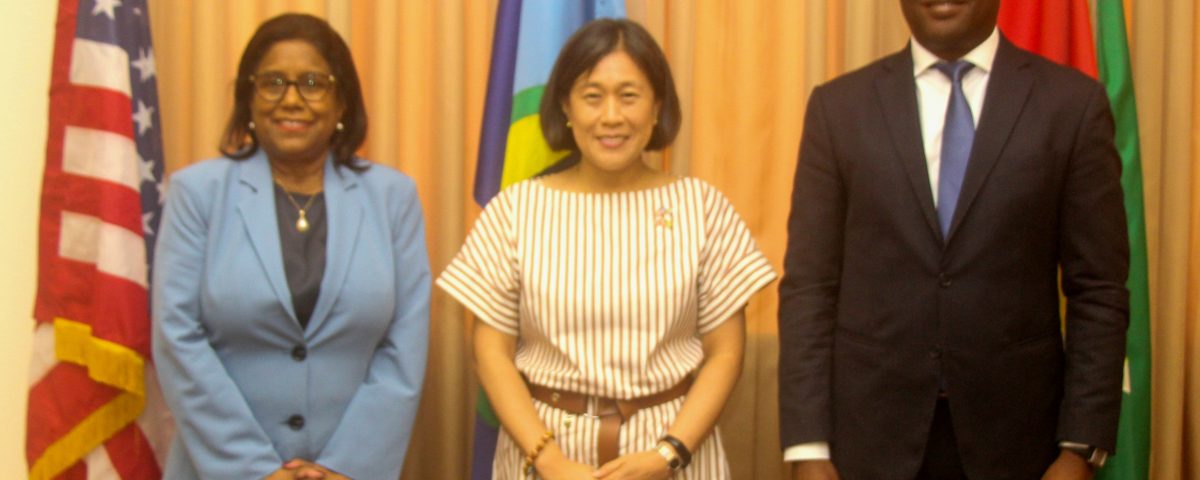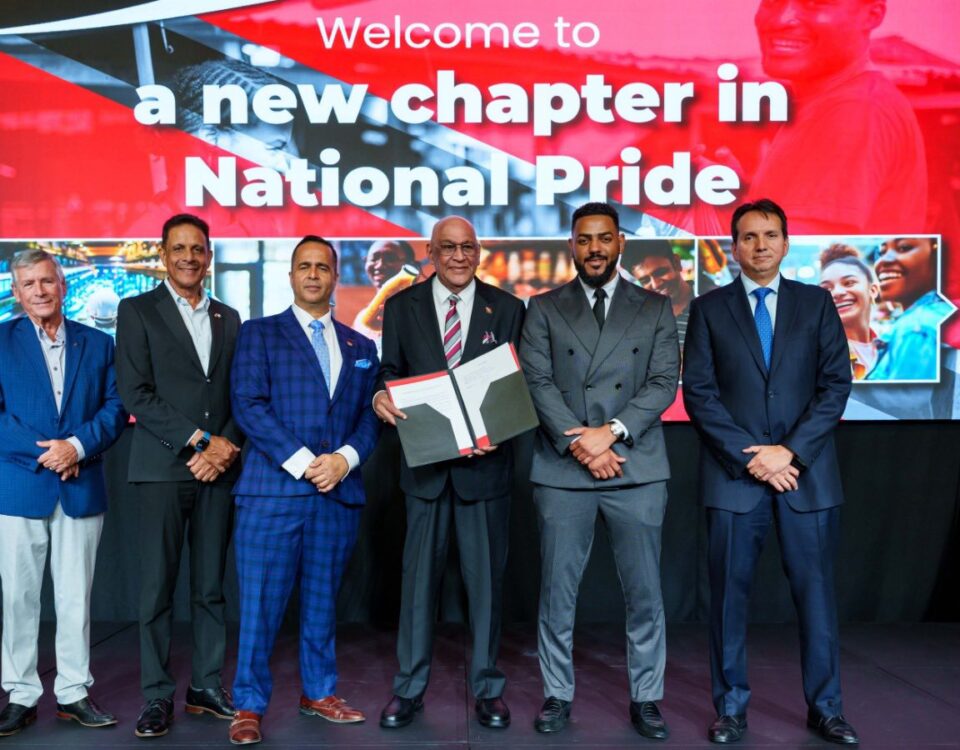Senator the Honourable Paula Gopee-Scoon, Minister of Trade and Industry and current Chair of CARICOM’s Council for Trade and Development (COTED), participated in a CARICOM Ministerial Meeting with the United States Trade Representative (USTR), Ambassador Katherine Tai on 2 August 2024. This Meeting was held in Georgetown, Guyana and also included participation by the Honourable Hugh Hilton Todd, Minister of Foreign Affairs and International Cooperation of Guyana, and representatives of the CARICOM Secretariat.
The United States is the top trading partner for CARICOM. The U.S. market accounts for over 40 percent of all CARICOM exports and just over 35 percent of its imports. In the five-year period 2018-2022, CARICOM’s exports to the U.S. grew by 93 percent. The U.S. is also Trinidad and Tobago’s top trading partner and has been the top destination for Trinidad and Tobago’s exports. In 2023, Trinidad and Tobago’s exports to the U.S. valued approximately TT$16 billion, accounting for 35 percent of total exports to the world.
Trinidad and Tobago and CARICOM’s trade with the U.S. is governed by a non-reciprocal preferential arrangement known as the Caribbean Basin Initiative (CBI). The CBI is a collection of trade programs between the United States and its neighbours in the Caribbean and Central America, and is designed to facilitate and increase the economic development of Caribbean economies. It does this by providing beneficiary countries with duty-free access to the U.S. market for most goods.
The Meeting served to allow for open and frank discussions on improvement of the Region’s trading relationship with the U.S.
Minister Gopee-Scoon, in her capacity as the current Chair of the COTED, in delivering Opening Remarks, highlighted that the CBI programmes were the backbone of the Region’s trade relationship with the U.S. She indicated that notwithstanding the non-reciprocal preferential access afforded to CARICOM products under the CBI to enter the US market, CARICOM’s imports from the U.S. exceeded its exports, leading to a persistent trade deficit. In this regard, she cited that the Region stands ready to engage the U.S. on measures that can be implemented to ensure that the region’s exports to the U.S. continue to grow.
Minister Gopee-Scoon indicated that recent events such as the global pandemic have demonstrated global dependence on international trade, and the recent passage of Hurricane Beryl has re-emphasized the Region’s vulnerability to the catastrophic effects of the changing global climate. She indicated that in this regard, there is a need to pursue policy objectives that would improve the resilience of, and incorporate CARICOM into, global supply chains.
Ambassador Tai shared that the CBI is here to stay, but like all programmes it needs to be periodically updated to remain relevant to the evolving needs of its beneficiary countries. She indicated that the U.S. is developing additional areas for inclusions in trade negotiations that are an integral part of its trade policy, and invited CARICOM to be involved in the shaping the U.S. trade and investment instruments toward the Region.
In this regard, Ambassador Tai highlighted some key areas which the current U.S. administration aims to incorporate into its trade policy. The first is inclusiveness, which seeks to ensure that trade policies take into account measures to involve and empower youths, women, the disabled, indigenous peoples, diaspora populations, and remote and rural communities. The specific needs of these groups are to be incorporated in trade policy development to ensure that the gains of trade accrue to all. She cited that the U.S. is revitalising its tripartite approach to policy development, which incorporates the needs of labour and the worker in the discussion.
Ambassador Tai also indicated that measures would be pursued to formalise the “care” economy, that is, caregivers for children, the elderly, the sick and disabled. These caregivers often operate in a largely informal sector. By formalising the sector, it would allow for better treatment and job security for employees. It would also provide opportunities for family members previously burdened with caregiving, which disproportionally constitutes women, to enter the workforce and realise their potential.
The U.S. also cited an area that CARICOM had previously raised in technical discussions on strengthening the resilience of supply chains. Ambassador Tai informed the meeting that the USTR was preparing a White Paper on supply chains which would be circulated to CARICOM and other stakeholders. The Paper would include the outcomes of widespread consultation on the matter and serve to develop policy and inform U.S. positions in trade negotiations.
Minister Gopee-Scoon agreed that there was a need to pursue trade policy instruments that go beyond tariff reductions and reap better outcomes for the peoples of the region. She expressed agreement with much of the policy direction shared by the USTR, and added that the policy should include targeted measures to stimulate small and medium enterprises (SMEs). She highlighted that nearshoring and Business Process Outsourcing are excellent areas that can target youth and women empowerment and can contribute to lower crime rates and a better standard of living in the region. She also cited the need for digitisation of SMEs and regulatory agencies as important steps toward achieving efficiency and improved trade performance.
In relation to specific concerns, Minister Gopee-Scoon indicated that some exporters expressed that accessing the CBI preferences were onerous and in instances where the tariff rate was low enough, opted to pay the rate of duty. She also called on the U.S. to investigate Puerto Rico rum producers, some of which may be using production methods which are not in line with Puerto Rican and U.S. Standards for rum. These production methods confer substantial cost advantages to these producers and when labelled as “Puerto Rico Rum” and sold in the U.S. and international markets, confers advantages to them and puts CARICOM producers at a severe disadvantage.
Minister Todd of Guyana, highlighted that the CBI and the Trade and Investment Framework Agreement (TIFA) that CARICOM has with the U.S., provides avenues for engagement of the Parties. He welcomed the high-level representation of the USTR at the meeting citing that this level of engagement was necessary to provide the impetus for the advancement of trade policy and to energise the private sector. He agreed that the diversification of CARICOM exports beyond its traditional markets and product range requires targeted efforts that can be pursued in the updating of the U.S. trade policy and instruments with the region.
In closing, Minister Gopee-Scoon highlighted, and the meeting agreed, that there is a need to set clear goals with timelines to realise the desired outcome of a trade policy informed by regional positions. The meeting agreed that there would be a follow-up meeting with CARICOM Ministers, as well as further technical level engagements with the U.S. to advance the development and implementation of inclusive trade policies.







